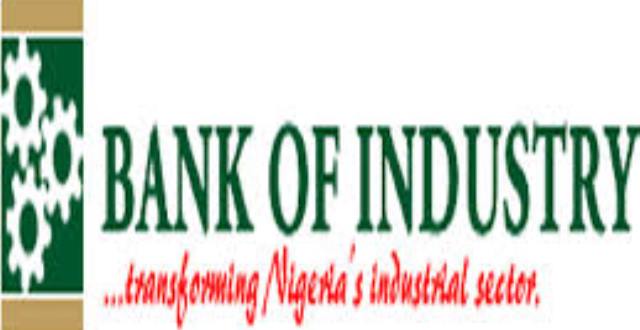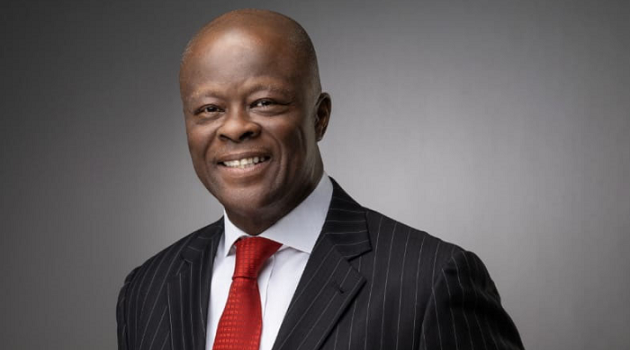E-Financial
BOI’s Disbursement to SMEs, Large Enterprises Hits Over N1trn in 6 Years

The Bank of Industry (BoI) has revealed that its disbursement to Micro, Small and Medium Enterprises (SMEs) and large enterprises has reached over N1trillion in six years.

According to the Development Finance Institution (DFI), the feat was achievable through strong strategic partnerships with various institutions in the state, federal government agencies and private sector organisations.
Oluwakayode Pitan, the Managing Director, Bank of Industry (BOI), disclosed this while speaking at the 37th Omolayole Management Lecture series themed, “African Continental Free Trade Area (AfCFTA)- Prospects for African Youth Leadership,” organised by the Lagos Chamber of Commerce and Industry (LCCI).
He said the BOI is at the forefront of industrialising the Nigerian economy and would continue to take deliberate steps towards addressing issues related to financing gaps across all business segments.
According to him, in the last three years, over $3 billion has been raised through the international financial market in its objective to continuously improve its capacity to bridge the huge financing gap that exist in Nigeria’s industrial sector.
He added that there is a growing number of start-up businesses in Africa at present, as young people are embracing their entrepreneurial mind-set and technological skills, resulting in the rapid digital transformation of the continent.
He advised that to address this risk and realise the gains expected for a free trade area, there is a need for increased infrastructure investment in Nigeria, saying that one way to achieve this is through public-private partnerships (PPPs), which should be significantly leveraged towards building sustainable infrastructural facilities across the country, while the Government provides an enabling governance framework.
“The newly established Infrastructure Company (InfraCo) will play a lead role in its implementation,” he added.
He added that despite making up a significant percentage of the continent’s population, the participation of young people in cross-border trade and trade governance matters is still very limited.
He said improving transparency and ease of doing business in Nigeria has a larger implication now that the AfCFTA has taken off, saying that this would enable foreign investors make informed decisions on where to site their manufacturing hubs within African nations that will provide them with more benefits.
“Because there are no restrictions on moving goods across borders, the need to establish a business in a country where it is easier to operate will now be a more desirable factor than the existence of market prospects,” he said.
Earlier, the president, LCCI, Toki Mabogunje, expressed concerns over the high level of youth unemployment pegged at over 33 per cent as at Q4 2020
She stated the urgent need for programmes and projects that engage the nation’s innovative, dynamic, youth to unleash their latent potentials for the benefits of the country.
She added that the AfCFTA provides an opportunity for our young entrepreneurs and startups to explore a continent-wide market if well launched, structured and implemented.
She stated that the agreement became operational on January 1, 2021 and marks the biggest free trade area globally in terms of the number of participating countries since the formation of the World Trade Organisation in 1995.
She added that while the take-off of AfCFTA should be lauded, much work remains to be done as critical parts of the agreement are yet to be finalised, stressing that several key issues including schedules of tariff concessions, schedules of service commitment, rules of origin, investment, competition policy and intellectual property rights have not been concluded.
The LCCI boss said AfCFTA has the potential to accelerate socioeconomic development of the African continent, saying that if well-implemented, it would stimulate economic growth, generate job opportunities, and helps to facilitate the economic diversification of African economies while ensuring people, products and services move freely across the continent.
She said according to estimations by the United Nations Economic Commission for Africa (UNECA), AfCFTA has the capacity to expand Africa’s manufacturing output to $930 billion by 2025, from $500 billion in 2016.
“The Brookings Institution also sees Africa’s economic size rising to $6.7 trillion by 2030 from $3.4 billion in 2019 on the back of a well-implemented AfCFTA.
A successful AfCFTA requires the active participation of Africa’s Young leaders in the implementation process, which is the rationale for selecting this edition’s topic which seeks to prepare, equip and put in place machinery that will help young leaders improve their management dexterity and hone their administrative expertise,” she added.
She stated that there is still a lack of clarity about the type of value addition that must occur within an AfCFTA State party for a product to benefit from tariff reduction, adding that there are pending negotiations at continental level delaying the implementation of the trade agreement.
“A great deal of sensitisation and enlightenment still need to be done on the implementation modalities,” she advised.
She also noted that there are concerns about the adherence of participating countries to the protocols within the AfCFTA framework, saying that Africa’s trade narrative, has been challenged by trade malpractices such as smuggling, unilaterism and violation of trade protocols,” she added.
In his lecture, Dr. Michael Omolayole said the provisions of the treaty setting up AFCFTA are, if sincerely implemented by African countries, likely to propel them from the third world to the first world.
“Believe me, | am not exaggerating. On our part as Nigerians, | think we were over cautious in being reluctant to ratify the treaty until the last moment. We could have avoided the hesitation, if we had set up a think-tank of brilliant and knowledgeable Nigerians in the matter of economics and free trade, right from the beginning of the African Union (AU) deliberating on the matter,” he said.
In his words: “Although | have not seen the treaty, | believe as an international instrument, provisions would have been made for countries especially the large ones like Nigeria, to protect themselves against breach of the treaty and against acts of sabotage.
It is better late than never, but thinktanks can still be set up and our brilliant young people with requisite knowledge should be encouraged to dissect and digest the treaty and to set up study groups to master the treaty inside out.”
E-Financial
Heritage Bank Depositors Seek National Assembly’s Help to Recover Trapped Funds

Depositors of Heritage Bank with deposits exceeding N5 million have appealed to the National Assembly to intervene and assist in the resolution of the bank’s license by the Central Bank of Nigeria (CBN).

The depositors claimed that the revocation has left them in financial distress, with their livelihoods and businesses hanging in the balance.
In a statement, the depositors expressed frustration that despite previous assurances from the CBN that the bank was not in distress, they have been unable to access their funds.
The situation, according to them, has led to widespread economic hardship with businesses shutting down, life savings crumbling, and daily expenses coming to a standstill.
The statement reads, “Some depositors have died from heart attacks, while others are hospitalized. We are at a loss, and our families are suffering.
“We are perplexed by the action exhibited by the CBN after Unity Bank merged with Providus Bank, which ensured a smooth transition of depositors. We are aware that First Bank was paid N460b of its deposits in Heritage Bank before its liquidation. Why should we be treated differently, subjected to an everlasting process to recover our funds from the sale of Heritage Bank’s properties?
“We plead that you intervene by advising CBN to pay all depositors in full without further delay. Advise that a few other banks absorb the depositors while ensuring a smooth transition as was done in the case of Unity Bank and Providus Bank.
“Utilize Heritage Bank’s reserve ratio to settle depositor’s claims. Treat depositors equally as was done with First Bank and verify NDIC’s claim of paying the insured sum to 85% of depositors and ensure prompt payment to all eligible depositors.”
E-Financial
Zumax Files N4.1Bn Suit against CBN over ‘Fraudulent’ Receivership

Zumax Nigeria Limited, an oil services company, has filed a N4.1 billion lawsuit against the Central Bank of Nigeria (CBN), alleging gross negligence and complicity in what it calls a fraudulent receivership imposed by the apex bank.

In the case, which is before the Federal High Court, Lagos, Zumax claimed that the CBN failed in its statutory duty to supervise banks and protect customers’ interests.
At the hearing of the matter on Tuesday before Justice Akintoye Aluko, Chief Wole Olanipekun (SAN) told the court that the Plaintiff (Zumax) had an application dated February 20, 2025, asking the court to hear the application.
He urged the court to allow him to move the application as the defendant had responded.
Olanipekun also told the court that the Plaintiff and defendant’s preliminary objections can be consolidated and heard together.
He stated that the priority of which application to be heard first shouldn’t arise as the Plaintiff has not opposed the hearing of CBN’s preliminary objection.
But Adeleke Agboola (SAN), counsel, counsel, told the court that the defendant has a preliminary objection in the suit, which commenced as a writ of summons challenging the jurisdiction of the court.
He argued that CBN filed its notice of preliminary objection within time and that the Plaintiff has responded to it.
Agboola said: “This preliminary objection has priority over any other applications. The Plaintiff’s application is not meritorious.
“There is no suggestion by the claimant that we did not file within time. We are saying that this court does not have the jurisdiction to hear this matter. I urge your lordship to allow us to argue this matter.
“There is no doubt that preliminary objection takes precedence; it says it must be heard first, and determining our objection is very serious; we have complied strictly by the rules.
“We urge this court to hear the preliminary objection and dismiss the Plaintiff’s application.”
In his response, Olanipekun said: “My learned friend said the application we filed is not meritorious. It is the court that can make any pronouncement on that.
“My lord, even when we talk of being tidy, we are not saying the court should not hear his preliminary objection. He is now the one saying that our application should not be heard.
“The court has to determine whether the objection has to be heard first or the Plaintiff’s application dated February 20, 2025, has to be heard first.
“It’s no longer the law; in fact, it has never been the law that when there is a preliminary objection, the court will say let’s take it first. We urge your lordship to take our application that has not been contested by the defendant.”
After listening to the submissions and arguments of both parties, Justice Aluko adjourned the case till April 22, 2025, for ruling on which application to hear first.
According to court documents, Zumax had and maintained its account with the defunct IMB International Bank Plc., which, under several mergers and consolidations of banks, ultimately fused into the much larger banking institution known as First City Monument Bank (FCMB).
The Plaintiff said it obtained a facility from IMB International Bank, an overdraft facility of N50m, which was later increased to N200m in/or at the first half of 1998.
However, the bank allegedly inflated the company’s debt and, by December 6, 2002, claimed it had risen to N465.6 million, the claim which was vehemently disputed by Zumax.
Zumax contends that FCMB, under its former Managing Director Edwin Chinye, took control of its foreign currency earnings held in a JP Morgan Bank account through its sister company, Redsear Limited.
According to the plaintiff, the Bank’s Managing Director not only insisted upon and got shares in Redsears Limited and a directorship of that company as a condition precedent for the loan, he also allegedly inserted himself as the lone signatory for the company’s bank account with JP Morgan Bank.
The plaintiff further alleged that “the bank misappropriated $ 4 million from this account, a shortfall discovered during an audit.
“Rather than addressing the dispute, FCMB appointed receivers to take over Zumax’s operations, a move the company described as fraudulent.
“The receivership, which lasted from December 2002 until 2022, led to severe financial losses, including the collapse of Zumax’s business and the loss of contracts with multinational oil companies such as Chevron.
“The company claimed it was unable to operate for two decades due to the receivership, which was based on what it describes as an entirely fabricated debt.
“Zumax further alleged that despite repeated petitions, the CBN failed to investigate FCMB’s actions or intervene to prevent the alleged financial mismanagement.
“The company maintained that a 2007 CBN report confirmed that it had paid over N547 million to FCMB, proving it was never in debt to the bank.
“Additionally, the Court of Appeal ruled in December 2021 that the consent judgment upon which the receivership was based was fraudulent and should be set aside.”
The plaintiff is seeking a court declaration that the CBN was negligent in its duty to regulate Nigerian banks.
It’s also asking for special damages amounting to $ 41 million, including lost income and asset depreciation; general damages of N2 billion, exemplary damages of N2 billion, and legal costs amounting to N100 million.
But the CBN’s preliminary objection is challenging the jurisdiction of the Court to hear the matter.
E-Financial
FG to Harmonise Fiscal Data Across MDAs

Efforts to harmonise fiscal data across government institutions have commenced in earnest, with Mr Wale Edun, minister of Finance and Coordinating Minister of the Economy, spearheading the meeting to achieve the mission.

Mr Wale Edun, minister of Finance and Coordinating Minister of the Economy,
Key stakeholders, including the Minister of State for Finance, Dr Doris Uzoka-Anite; the Accountant General of the Federation, Shamsedeen Babatunde Ogunjimi, and the Director General of the Budget Office, Mr Tanimu Yakubu, met on Monday with Edun, a statement issued by Director of Information in the ministry Mohammed Manga, said.
The said discussions centered on discrepancies in fiscal data across government institutions, which have affected Nigeria’s credit ratings and borrowing capacity.
The Minister emphasised the need for synergy between agencies such as the Budget Office, the Accountant General’s Office, and the Debt Management Office (DMO).
“Delivering accurate and comprehensive fiscal data is critical to economic stability and investor confidence,” Edun said Attendees agreed on the establishment of a Fiscal Data Coordination Framework, which includes a main committee, a subcommittee, and technical teams dedicated to standardising fiscal reporting methodologies and economic assumptions.
The Minister affirmed that Nigeria must take ownership of its fiscal data credibility, reducing dependence on external institutions.
The meeting concluded with a firm commitment to implementing the framework, reinforcing transparency, strengthening investor confidence, and enhancing Nigeria’s economic outlook.

 News3 days ago
News3 days agoPolice Arrest 4 Bank Staff over Alleged ₦270m Fraud, Money Laundering

 E-Financial3 days ago
E-Financial3 days agoUBA Grows Profit to ₦804Bn, Declares N3 Kobo Final Dividend

 E-Business3 days ago
E-Business3 days agoNIMC to Prosecute Nigerians Printing ‘NIN Cards’, Says Only Slip is Legal

 E-Business2 days ago
E-Business2 days agoFG Plans to Link Social Register to NIN for Humanitarian Crisis

 Telecom3 days ago
Telecom3 days agoOpen Access Fabrics Set to Drive Connectivity to Achieve a Digital Economy

 E-Business3 days ago
E-Business3 days agoUnleashing Nigeria’s Business Potential: The Cloud as Catalyst for Growth

 Telecom2 days ago
Telecom2 days agoKeystone Bank Seeks to Join Suit in Tussle over 9Mobile Shares Ownership

 Telecom3 days ago
Telecom3 days agoMTN Nigeria and Pan-Atlantic University Invite Media Practitioners for 4th Media Innovation Programme



























